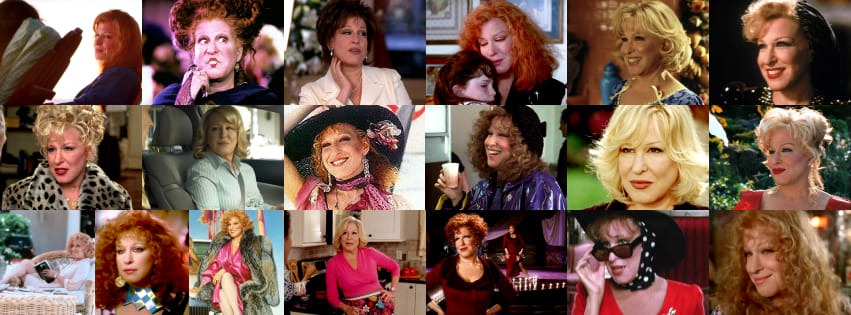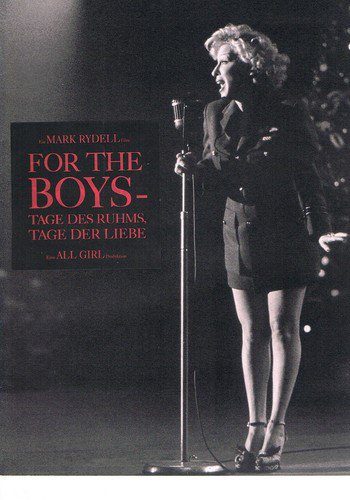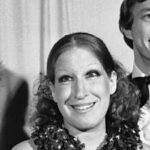Film Stories
Celebrating the amazing box office run of Bette Midler
By Simon Brew
May 24, 2021

She had one of the most incredible box office runs of hits in the 1980s and early 1990s, and it’s not talked about enough: celebrating the movie hits of Bette Midler.
It was back in the summer of 1988 that the long-gone (and sadly missed) Premiere magazine in the US ventured onto the set of an upcoming Touchstone comedy. Touchstone was the label set up by The Walt Disney Company earlier that decade, to allow it to target an older audience without compromising the wholesome family values (or something) of the Disney name. And under the eye of Disney’s then live-action movie boss Jeffrey Katzenberg, it became known for modestly costed, hugely profitable hits. Films such as Stakeout, Three Men And A Baby, Dead Poets Society, and Sister Act would go on to be amongst the higher-profile examples of its successes.
When conversations take place about the comedy box office champions of the 80s, the usual names seem to pop up. Eddie Murphy, Steve Martin, Goldie Hawn, Dan Aykroyd, Bill Murray, and Steve Guttenberg (yep, really) are but a few examples. Yet none of them enjoyed anywhere near the consistent run of box office hits that Bette Midler headlined from the mid-to-late-80s (creeping into the early 90s, too). And, unusually, all of them were for one studio. That 1988 Premiere article, then, was about a movie called Big Business, that Midler co-starred in. And it was the latest in an extraordinary run of box office successes for her.
Where it began

Midler first struck box office gold for Touchstone and Katzenberg right at the start of 1986. She co-starred with Nick Nolte and Richard Dreyfuss in Paul Mazursky’s Down And Out In Beverly Hills (adapted from a French stage play). This was, pub quiz fans, the second Disney-backed movie to earn an R-rating, and it proved to be a hugely successful one. Costing a relatively humble $14m to make, box office receipts shot past $60m in the US (a very sizeable amount by 80s box office standards), and reviews were positive too.
Midler was second-billed, so it wasn’t clear how much her sizeable profile as a singer brought audiences to the film. But even as the tills were ker-chinging for Down And Out, Midler was already polishing off a second comedy for Touchstone, one that would follow into cinemas just over six months later. And it would be another big hit.
This time, she was recruited to star alongside Danny DeVito, Judge Reinhold, and Helen Slater in Ruthless People. A film also notable for being the first ‘straight’ cinema comedy from spoof movie legends Jim Abrahams, David Zucker, and Jerry Zucker, this one is a dark, funny tale of a couple who kidnap their ex-bosses wife, only to discover he has no intention of paying the ransom.
It’s a four-hander, this, with Midler as the kidnapped wife who has no intention of playing nice. It’s here that you get a snapshot of how Midler can both steal a scene and be a generous part of a comedy ensemble. In fact, the bulk of her biggest hits have seen her playing off other performers, in casts where it feels everybody is on each other’s shoulders, rather than their backs.

When it wrapped, Ruthless People again earned an R-rating, but this didn’t stop audiences flocking to see the film. Touchstone had another Bette Midler-powered hit on its hands, with the box office total this time creeping past $70m – not bad at all for a film that cost under $9m to make.
The legendary screenwriter William Goldman once wrote that at the turn of the millennium, every studio wanted to make an Adam Sandler movie. They were cheap to make, and the box office returns were sizeable (heck, at that stage, some of the films were good too). Here, Bette Midler was making better films and fuelling the Touchstone label over a decade earlier.
And the hits came coming.
In fact, it was after a third straight success – which I’m coming to shortly – that Disney moved to secure Midler’s services longer term. Thus, four years after he’d inked a five-picture deal with Eddie Murphy when he was at Paramount Pictures, Katzenberg secured a similar deal with Midler. This time, Katzenberg wanted at least three more Bette Midler movies for Disney, and – unusually – he signed her to such a deal.
It’s unusual because, at that stage, such deals were getting much, much rarer. The agreement Katzenberg had previously inked with Eddie Murphy was in itself something of a hark back to the system of old, where studios would tie down a performer to its movies. The Midler deal felt even rarer.
Wild rose

The irony for Midler in committing to more was that at the time she signed up for the first tranche of Disney pictures, she couldn’t get film work anywhere else. After she’d made 1979’s The Rose, which fizzled at the box office, it took years for her to land another film job. (Mister D: I really loved that Mr. Brew took on this topic because somehow she always gets overlooked on these best of lists but whenever she comes back with a new big project she explodes on the scene. I read this a lot, “Thank God, Bette Midler is back! And I do that everyday!, Anyway, I had to take issue with how The Rose was just kind of tossed off like it was this big bomb and Bette just didn’t get any scripts. First, she made the most thrilling debut in movie history with this role that I haven’t seen anyone come close to since. In fact, I consider it my favorite movie of all time. I won’t tell you how many times I saw it, because people will think I’m crazier than I already am. Hell, she was nominated for an Oscar as Best Actress. In retrospect I have heard some film critics say she should have won. But I never, ever heard it described as being a movie that fizzled at the box office and it showed Hollywood they had a major talent on their hands. I don’t know what happened but Bette sure didn’t let Hollywood down, in fact, it was the opposite. Yes, she went on to become a legend. But, she had so much more in her that Hollywood just seemed to ignore, and I’m talking about meaty roles in dramatic parts. But I’ve had to go to rehab and anger management courses over that (j/k) There’s a comment by a young man, Kris, that will do a better job than me with explaining why it was a hit along with it’s double platinum soundtrack, it’s number 3 single, The Rose, sung by Bette Midler who won a Grammy that year for Best Female Vocalist. With all that, it sure wasn’t a fizzler. And I’ll add that The Rose was made on a Budget of $8,500,000, and grossed $29,174,648. Now this was in 1979, so I don’t know the adjustment of that figure today, but I’m lazy tonight. But somebody made a huge windfall in profits. So I rest my case. Something tells me something bigger was at work here just to toss this movie aside without mentioning all that was going on around this divine crowning jewel.) That job wouldn’t help matters, as it turned out to be a largely forgotten movie by the name of Jinxed. Midler was a name in music (interestingly, in her early movies, she barely played the music card in her performances), but she wasn’t opening films.
Katzenberg, meanwhile, was notorious for snapping up talent on relatively modest salaries. As such, the pictures he was developing for Touchstone never went for stars, rather relatively well-known performers, but not ones guaranteed to open a film. Midler – in the movie world at least – fit that criterion, and he hired her for those first few comedies, an arrangement that was clearly mutually beneficial. That said, for the first of the films – the aforementioned Down And Out In Beverly Hills – she took some persuading to sign up. As much as she was happy to be offered a good role in a movie, the-then 40-year-old Midler was a little perturbed at first to realize she’d be playing the mother of a 20-year-old in the film.
As she told the New York Times back at the time, though, “I thought ‘oh what the hell, who cares?’”, and signed on the dotted line. She didn’t look back.
Katzenberg signed her to that aforementioned new three-picture deal in 1987. In doing so, he declared that “he was investing in the Bette Midler business”. It would be a shrewd investment. Midler’s third Disney comedy in a row, Outrageous Fortune, had just opened at the US box office and was clearly already another hit.
The film would go on to smash through $50m at the box office, incredibly rare for an 80s movie headlined by two women, with Shelley Long her co-star. There was a reported slight battle over billing, though, with Disney at different times promising both stars the top spot. A compromise was hammered out that meant in some states in the US, Midler got top billing on the poster, in others that went to Long.

Not only was Outrageous Fortune another success, this one finally seemed to persuade the broader Hollywood ecosystem that Midler was someone who had quietly emerged as a movie star in her own right. Directed by Arthur Hiller (Love Story), Midler also got some of the best notices of her film career for it. In fact, she’d snare a Golden Globe nomination for the movie, too.
With that Disney deal in place, and another box office hit in rapid-fire succession to her name, the hunt was on for what next. Could she pick a collection of films that would earn her an extension to this remarkable run?

Yes. Yes, she could. Next on the slate was a reunion with Jim Abrahams, this time as sole director for Big Business. Again, Midler chose a project headlined by two women, albeit one that had been originally put together for Barbra Streisand and Goldie Hawn. When they didn’t sign up, though, Midler stepped in.
Her co-star this time was Lily Tomlin. And in this case, not only did Midler and Tomlin get their names above the title, they got them there twice. They played identical twins, allowing the marketing team to list Midler first and last above the title, with Tomlin second and third. The film itself tapped heavily – and deliberately – into farce, and it’s a straight crowdpleaser. Again, quite a successful one. $40m was banked this time – before takings from the likes of video – although the critical response was just a little more muted.
But then in its own way that was a testament to the box office pulling power of Midler. Could she headline a film that was earning less enthusiastic reviews and steer it to a hit? Again, yes. And whilst Big Business is a fun, fluffy film to revisit, the two leads really lift it.
For her next project, though – once she’d lent her voice to Disney animation Oliver & Company – Midler was looking for something a little different, and a deliberate shift away from comedy. And that’s where we come to arguably the film for which she remains the best known: one of the 80s’ most commercially successful weepies, Beaches. Based on the novel by Iris Rainer Dart and adapted for the screen by Mary Agnes Donoghue, again Midler opted for a film headlined by two women. In this case, her co-star was Barbara Hershey. Meanwhile, Garry Marshall was hired to direct, and he’d deliver a one-two for Disney, moving straight on to Pretty Woman once he wrapped.
Developed under the title of Forever Friends, Beaches was always intended for Midler to take on the lead role of CC Bloom (and she’d be a producer on the film too). The role of Hillary, though, was trickier to cast, and when Hershey came in for her audition, she faced a problem: Midler wasn’t able to be there so they could do their lines together.
As a consequence, as Hershey would recall to the New York Post at the end of 2018, her agent reported she was the best of those who auditioned, but that the head of the studio felt there was something missing between her and Midler. “Did you tell him it was Bette?” she quickly retorted. She ultimately landed the role, and for a film building to a tragedy, the shoot was light. Credit in part the late Garry Marshall, whose background of course lay in comedy.

Still, the final cut was tough, and those involved were genuinely worried about screening the movie to Disney bosses. To the point, in fact, where Marshall himself just sat outside in his car while they watched it. But their fears were ill-founded. As producer, Margaret South recalled, the tough guy Disney executive whose opinion they were counting on was in floods of tears at the end. They were good to go.
That executive wasn’t alone. Whilst the immediate critical response to the film was hardly earth-shattering, and there was barely a sniff of a notable award nomination (save for an Oscar nomination for Art Direction), audiences flooded to Beaches. Nearly $60m was banked for arguably the least commercial – on paper at least – of the run of films Midler was making for Disney. More than any other in that run too, Beaches has endured. A stage adaptation also came along in 2014, and an American television remake was broadcast in 2017. The original film, though, has remained a strong catalog title for Disney.
Next steps

Whilst Marshall went on to Pretty Woman, Midler took some different steps in her film career. Her next project was actually produced by The Samuel Goldwyn Company, although Touchstone would release it. It was 1990’s Stella, based on the 1923 novel Stella Dallas by Olive Higgins Prouty. It was a notable change of tone for Midler – a more serious drama about a single mother fighting for the best for her daughter. It was also a lower key project that didn’t really find its audience. Grossing $20m in the US, it nonetheless still opened in second place at the box office. Roger Ebert was one of the few critics who fought its corner, writing “go to sneer. Stay to weep”. Almost inevitably, 1990’s box office was hardly awash with tales of single mothers.

Midler stayed with Disney and reunited with Paul Mazursky for her next film, Scenes From A Mall. A real oddity, this is notable for being one of the few films Woody Allen has acted in without writing and/or directing. The film broke even, but already Midler was hard at work on the underrated 1991 musical drama For The Boys. That was a bumpy film (one with a fanbase, though), made for a different studio – 20th Century Fox, in this instance. Even though it fell a little short of expectations at the box office, Midler won a Golden Globe and picked up an Oscar nomination for taking on the role of Dixie Leonard, an actor, and singer who entertained the troops during World War II.
The early 90s did deflate Midler’s box office bubble just a little, although not to the point where her incredible achievement and run of success should become so overlooked. What’s more, Midler had two more aces up her sleeve.
In 1993, she starred in one of her personal favorites, Hocus Pocus, again for Disney. Headlining a terrific ensemble, the film is said to shift a million DVDs a year every Halloween. Then there was The First Wives Club, a sleeper hit for Paramount that exploded in 1996 and saw her top the box office again.

Following that, Midler took on further screen roles but was devoting more and more time to her music, including a well-received HBO special. She continues to tour, she continues to record, she takes on stage work, and she was back on the big screen last year, voicing Grandmama Addams in the latest take on The Addams Family. But amongst those achievements, she’s also enjoyed a box office run of hits that few of her contemporaries – male or female – have ever managed to match.
Thank you for visiting!
If you’d like to support our attempts to make a non-clickbaity movie website:
Become a Patron here.
Follow Film Stories on Twitter here, and on Facebook here.
Buy our Film Stories and Film Stories Junior print magazines here.







I loved this guy hahaha
Xoxo
This article said “THE ROSE” fizzled at the box office. One other time during Bette’s string of Touchtone hits I remember Time Magazine calling “THE ROSE” a “commercial failure” in a cover story on Bette. Don, you would agree that “THE ROSE” was a huge box office success wouldn’t you? I mean my parents took me to see it when it was released and the Soundtrack was a huge top ten hit album. She received an Oscar nomination for her performance. I remember reading once that it grossed 55 million dollars. “THE ROSE” has never been considered to have “fizzled” but is regarded as a hit movie that is now legendary, wouldn’t you agree?
1988: Tom Cruise
– Star score: 429
– Top contributing films: Top Gun, Rain Man, Cocktail
– #2 Star: Bette Midler (- Star score: 427, – Top contributing films: Ruthless People, Down and Out in Beverly Hills, Beaches)
Bette was the #2 box office draw in 1988, just 2 points behind #1 Tom Cruise, and made the top 10 list twice.
I totally agree that Bette Midler was & still is the greatest actress we have ever known, I also know no one will ever be able to match her because she has more natural emotions in her than most have in a lifetime, I know she is my # 1 favorite & I have a lot of friends that feel the same way.
I sent an earlier message criticizing Simon Brew for stating in his article that “THE ROSE” fizzled at the box office but it never got published. For this article to report such positive aspects of her career but put a negative spin on her greatest triumph “THE ROSE” was not a reasonable assessment. “THE ROSE” did not “fizzle” at the box office. It was an enormous success both critically and financially. It even produced a top ten soundtrack and a number one hit single. It also earned an Oscar nomination for Bette. I feel it would be irresponsible to allow this bit of misinformation to not be correctly revised.